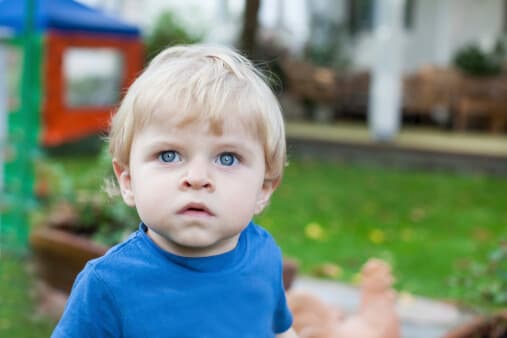Infantile Acne

Question
Dr. Greene, my son is now 17 months and still has a whitehead on his cheek, and he also has blackheads. If he got them from breast-feeding I sure won't breast-feed the next one. I would really like his skin to clear up already, and the whitehead on his face is raised and very obvious. I have even tried to use pore strips to remove them. I am desperate and depressed to see my poor baby's skin so teen-aged already. Help!!!!!!!!
Worried and Concerned Parent
Dr. Greene's Answer
Toddlers often have the cutest little faces! How frustrating when acne gets in the way. When most people think of acne, they think of the pimples that affect about 80% of teens as they go through puberty. But acne can occur at any time in life when hormones are in flux. Think mid-life, for instance, when 6% of men and 8% of women in their 50s have acne (British Medical Journal, 1979;1:1109–1110).
New parents often learn about an early round of acne– newborn acne or neonatal acne –that comes and goes during the first weeks or months of life. Newborn acne is usually quite mild. Because newborn acne is very common, when people see pimples on a baby, they usually reassure the parents that they will disappear soon on their own.
But for a few kids, this is not true.
There is another variety called infantile acne that often lasts 2 or 3 years unless properly treated. It has even been reported to last as long as 11 years (Clinical Pediatric Dermatology, WB Saunders, 1993). It is more common in boys than in girls. These kids have skin that is particularly sensitive to the male hormones that are often at relatively high levels in the early years (Dermatology, 1998;196:95–97).
Sometimes infantile acne is so mild that daily, gentle cleansing with a mild soap and water is all that is needed. But it’s not unusual for infantile acne to be more serious (Pediatric Dermatology, 1997;14:17–21). If gentle cleansing doesn’t do the job, a mild topical agent (such as a prescription form of benzoyl peroxide for infants or a topical antibiotic) can often help both the current situation and prevents scarring. If the problem persists, see a pediatric dermatologist for stronger treatment. There are enough good options available that your toddler shouldn’t have to live with prominent pimples on his face.
If a pediatric dermatologist can’t get it under control or if there are any other signs of puberty (e.g. deep voice, pubic or underarm hair), then someone should investigate for conditions that cause abnormally high levels of puberty hormones.
Nursing, by itself, doesn’t cause acne. But drugs can trigger it, whether taken by the baby or by a nursing mom. The most common culprits are steroids (either oral or topical), antidepressant medicines, antiseizure medicines, lithium, iodides, bromides, and antituberculosis drugs. Oral contraceptives do pass through into breast milk and are steroids that can occasionally cause acne and breast enlargement in the breast-feeding children.
When teens look in the mirror, their pimples often look gigantic even when friends barely notice them. Being a parent can affect our perceptions as well. Sometimes we don’t notice our children’s blemishes, even when they are obvious to others; sometimes our kids’ blemishes are glaring to us and not noticed by others.
Whatever the case, you and your darling son needn’t “just wait until they go away.” You both deserve for these to be treated effectively.
My oldest son is just now going through puberty. What a wonderful, bittersweet time! Your son’s bout with “teenage skin” is a good reminder to us all that childhood rushes by in slow motion–the stages seem long, but…


